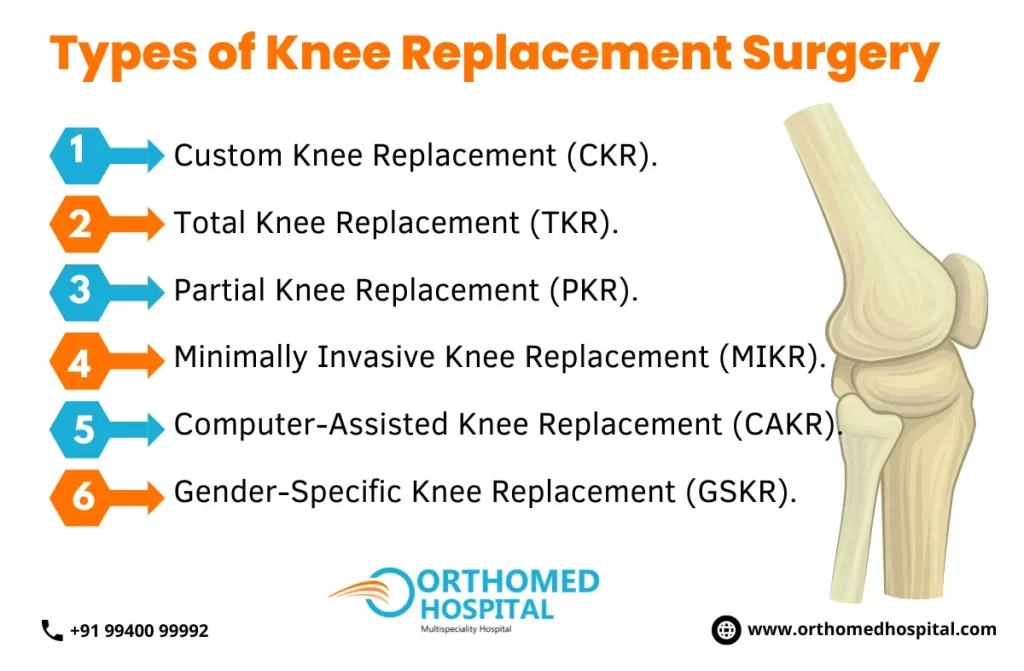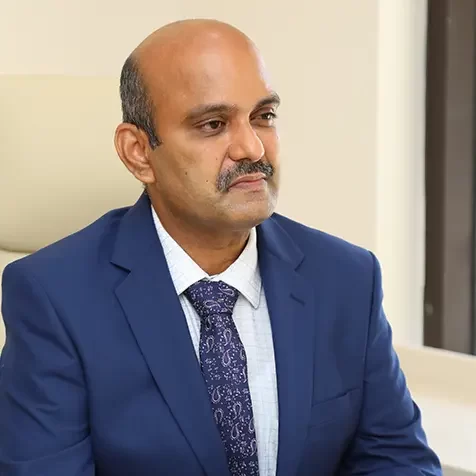Knee replacement surgery, also known as knee arthroplasty, is a surgical procedure that involves the removal of damaged or diseased portions of the knee joint and replacing them with artificial components made of metal, ceramic, or plastic. This procedure is typically performed by the best knee replacement surgeons in Chennai for patients with severe knee pain or limited mobility due to osteoarthritis, rheumatoid arthritis, or other knee conditions.
Finding the best surgeon for knee replacement is crucial as the success of the surgery and the patient’s overall outcome depend on the expertise and skill of the surgeon. A good surgeon can ensure proper preoperative evaluation, optimal surgical techniques, and postoperative care, leading to a quicker and smoother recovery with an affordable knee replacement surgery cost in Chennai.
Qualities of a Good Knee Replacement Surgeon
The best knee replacement surgeon in Chennai should have several qualities to provide the best possible care for their patients.
- Firstly, they should have extensive education and training in orthopedic surgery, specifically knee replacement.
- Secondly, experience is crucial, as it allows the surgeon to handle a wide range of cases, including complex ones.
- Thirdly, board certifications and affiliations with reputable medical associations indicate a surgeon’s commitment to staying up-to-date with the latest techniques and advancements in knee replacement surgery.
- Fourthly, patient reviews and outcomes provide valuable insights into a surgeon’s track record of success.
- Finally, the best knee replacement surgeons in Chennai should be accessible and available to answer questions and concerns throughout the surgical process.

Top 10 Best Knee Replacement Surgeons in Chennai
Dr. A. Subair Khan
Dr. A. Subair Khan, the Founder, and Managing Director of Orthomed Hospital, is a distinguished expert in knee replacement surgery, arthroscopy surgeries, and sports injury treatment. He has extensive experience in providing advanced knee treatments to patients with primary and complex conditions.
He is one of the best knee replacement surgeons in Chennai having performed over 3000 successful surgeries. Also, he is also skilled in handling complex surgeries related to elbow, ankle, hip joints, and shoulder, enabling patients to enhance their quality of life.

Prof. Dr. S. Sundar
Prof. Dr. S. Sundar is a distinguished orthopaedic surgeon renowned for his exceptional expertise and compassionate care at VS Hospitals in Chennai. Proficient across a diverse spectrum of orthopaedic procedures, he specializes in complex trauma care, and joint replacement surgery encompassing hip, knee, and shoulder, and he adeptly addresses various bone tumors.
With an impressive track record of numerous successful joint replacement and limb salvage surgeries, his commitment extends to the holistic well-being of his patients. Beyond his surgical prowess, he is fervently dedicated to promoting public awareness regarding osteoporosis prevention.

Dr. L. Bharath
Dr. L. Bharath, a certified Orthopedic Surgeon from Bharath Orthopaedics has over a decade of experience in performing knee and hip replacement surgeries. He has completed over 10,000 successful procedures and is known for his fast-track recovery joint replacement techniques.
The best knee replacement surgeons in Chennai offer painless procedures, rapid recovery, quick rehabilitation, and lower infection rates after surgery. With his vast professional experience, he aids patients in enhancing joint function and improving their quality of life.

Dr. J. Srinivasan
Dr. J. Srinivasan is an Orthopaedist and Sports Medicine Surgeon with over 21 years of experience. He practices at VS Hospitals, Sri Balaji Hospital, and Srinivas Priya Hospital. This best knee replacement surgeon in Chennai is a member of the Indian Medical Association and Indian Orthopedic Society (UK).
This best knee replacement in Chennai ensures to provide revision knee replacement, shoulder instability, knee arthroscopy, shoulder joint replacement, and knee replacement surgeries making the treatments cost-effective.

Dr. S. Manikkavelayutham
Dr. S. Manikkavelayutham from Vinita Hospital is a popular knee replacement specialist with almost 20 years of experience. He specializes in trauma and joint knee replacement surgery, advanced fracture management, and deformity correction.
He provides sophisticated care to patients of all ages, answering their questions about knee replacement surgery options and knee replacement surgery cost in Chennai. His expertise helps patients with knee disorders or injuries to improve their condition and enjoy a better quality of life.

Dr. Prakash Selvam
Dr. Prakash Selvam holds the distinguished position of Chairman and Managing Director at CTS Specialty Hospital in Chennai, India. Widely recognized as one of the best knee replacement surgeons in Chennai, he possesses remarkable proficiency in trauma care, spine surgery, arthroscopy, joint replacement, and sports medicine.
His prominence in the field stems from his innovative surgical techniques and vast experience, which have significantly contributed to the advancement of orthopedic medicine. His commitment to excellence and unwavering dedication to patient well-being underscore his reputation as a leading figure in the realm of orthopedics, earning him the status of a renowned and respected medical practitioner.

Dr. Arun Kumar
D.Ortho., MRCS(Edin), MRCS(Glas), FRCS(Trauma & Ortho), MCh(Ortho) Liverpool
Consultant Orthopaedic Surgeon at Medway Hospitals
Dr. Arun Kumar is a highly esteemed consultant orthopaedic surgeon at Medway Hospitals, with a distinguished career spanning over 14 years in the United Kingdom. He specializes in advanced arthroplasty and arthroscopy procedures, with extensive expertise in knee and hip replacements, as well as shoulder and elbow replacement surgeries. His proficiency in minimally invasive arthroscopic procedures (keyhole surgery) is well-recognized, particularly in ligament reconstruction of the knee and shoulder.
Dr. Kumar’s commitment to patient care and surgical excellence has earned him a reputable position in the orthopaedic community. His advanced training and clinical experience make him a trusted specialist for complex joint replacement and reconstruction surgeries. Dr. Kumar is considered among the Best Knee Replacement Surgeons in Chennai, known for his precision and patient-focused approach.
Dr. Madan Mohan Reddy
MBBS, MS Orthopaedics
Veteran Orthopaedic Surgeon Specializing in Arthroplasty and Sports Injury Treatment
Dr. Madan Mohan Reddy is an esteemed orthopaedic surgeon with nearly two decades of experience. He practices at our premier Knee Replacement Hospital, where he specializes in arthroplasty and sports injury treatment, particularly knee and shoulder surgeries, as well as knee replacements. His medical career includes significant tenures in both India and the United Kingdom.
A gold medalist and recipient of the Best Citizens of India Award (2002), Dr. Madan is committed to advancing medical techniques in orthopaedics. He is a member of the Indian Orthopaedic Association and the Indian Medical Association, providing services such as joint replacements, arthroscopy, and fracture treatment.
Dr. Madan’s expertise extends to joint preservation surgeries, arthritis and osteoporosis treatment, and addressing various musculoskeletal issues. His dedication to patient care and surgical innovation places him among the Best Knee Replacement Surgeons in Chennai.
Dr. Karthik P Reddy
MBBS, MS Orthopaedics
Renowned Orthopaedic Surgeon with Robotic Surgery Expertise
Dr. Karthik P Reddy is a leading orthopaedic surgeon dedicated to delivering top-quality patient care. He completed his MBBS from Guntur Medical College and his MS in Orthopaedics from SDUMC, Kolar, followed by a DNB in Orthopaedics from the National Board of Examinations, New Delhi. Dr. Reddy further honed his skills through specialized fellowships in arthroplasty and arthroscopy in Germany and Singapore.
Certified as a robotic surgeon, Dr. Reddy has performed over 500 robotic joint replacements, including a live robotic knee replacement surgery for TNOACON. His areas of expertise include robotic joint replacements, shoulder arthroscopy, and knee arthroscopy. He is an active faculty member at state-level arthroplasty and arthroscopy conferences and holds memberships in prestigious organizations such as AANA, SICOT, AAOS, ISTA, IAS, and IOA.
Dr. Reddy’s innovative approach and dedication to the advancement of orthopaedic surgery make him a respected figure in the field. His cutting-edge techniques and compassionate care contribute to his reputation as one of the Best Knee Replacement Surgeons in Chennai.
Dr. Lenin
He is an esteemed knee replacement surgeon at Dr. Lenin’s OrthoInde boutique hospital. With over 20 years of experience, this best knee replacement surgeon in Chennai has successfully performed countless arthroscopic and joint knee replacement surgeries.
His main objective is to make orthopedic treatment affordable and accessible to everyone. He is one of the renowned knee replacement surgeons in Chennai who adopts a holistic approach to treating knee and shoulder problems using minimally invasive techniques, resulting in high success rates.

When should you consider knee replacement surgery?
Knee replacement surgery, also known as knee arthroplasty, is a common orthopedic procedure that involves replacing damaged or diseased knee joint surfaces with artificial components. The surgery is usually recommended when conservative treatments such as medication, physical therapy, and lifestyle changes have failed to provide adequate relief from knee pain and mobility problems.
Here are some situations where knee replacement surgery may be considered:
- Osteoarthritis: Osteoarthritis is a degenerative joint disease that can cause pain, swelling, stiffness, and difficulty walking.
- Rheumatoid Arthritis: This is a chronic autoimmune disorder that can affect multiple joints, including the knees. Knee replacement surgery may be recommended if other treatments have not been successful.
- Knee Injuries: Injuries to the knee joint, such as a torn meniscus or ligament damage, may require knee replacement surgery if they cannot be repaired through other methods.
- Knee Deformities: Certain conditions, such as severe bowing or knock-knees, may cause uneven wear on the knee joint and may require knee replacement surgery to correct.
- Failed Previous Knee Surgeries: If previous knee surgeries have failed to relieve pain or improve mobility, knee replacement surgery may be considered.
The decision to undergo knee replacement surgery should be made in consultation with the best knee replacement surgeons in Chennai. Factors that may be considered include the severity of pain and disability, the patient’s age and overall health, and the risks and benefits of the surgery.
What happens during knee replacement surgery?
During a knee replacement surgery, the diseased or damaged portions of knee joints are replaced with artificial components. The surgery is typically performed under general anesthesia or regional anesthesia, which numbs the lower half of the body.
The surgery generally follows these steps:
1. Incision: The surgeon makes an incision in the front of the knee to expose the knee joint.
2. Resection: The surgeon removes damaged or diseased portions of the femur (thigh bone), tibia (shin bone), and sometimes the patella (kneecap). The remaining bone is prepared to accept the artificial components.
3. Implantation: The artificial components are inserted into the knee joint. Typically, the tibial component is made of metal and plastic and the femoral component is made of metal. The patellar component may also be replaced with a plastic button.
4. Closing: The incision is closed with sutures or staples, and a sterile dressing is applied to the knee.
After the surgery, the patient is taken to a recovery room and monitored closely for several hours. Pain medication and antibiotics may be given by the best knee replacement surgeons in Chennai to help manage pain and prevent infection. Physical therapy will begin soon after the surgery to help the patient regain strength, mobility, and flexibility in the knee joint.
Most patients are able to go home within a few days of the surgery, and recovery time varies depending on the individual patient and the extent of the surgery. Full recovery may take several months, but most patients are able to resume normal activities with reduced pain and improved mobility.
What are the advantages of Knee replacement surgery?
Advantages of Knee Replacement Surgery:
1. Pain Relief: One of the primary benefits of knee replacement surgery is significant pain reduction. The surgery replaces damaged joint surfaces with artificial components, eliminating the source of chronic pain and providing relief to individuals who have been suffering from severe knee pain.
2. Improved Mobility: Knee replacement surgery restores the functionality of the knee joint, allowing individuals to regain mobility and perform activities that were once limited or impossible. Patients experience an increased range of motion, enabling them to walk, climb stairs, and engage in physical activities more comfortably.
3. Enhanced Quality of Life: Chronic knee pain and limited mobility can greatly affect a person’s quality of life. Knee replacement surgery can have a transformative effect, enabling individuals to return to their daily routines, work, and hobbies, and enjoy a better overall quality of life.
4. Correction of Deformities: In cases where knee joint conditions have caused deformities, knee replacement surgery can help correct these abnormalities. By aligning the bones and restoring the natural shape of the joint, the surgery improves stability and balance, enhancing the overall functionality of the leg.
5. Long-Term Durability: With advancements in technology and materials, modern knee replacement implants can withstand the demands of everyday activities, providing patients with functional joints for many years.
6. Psychological Well-Being: Chronic knee pain and limited mobility can take a toll on an individual’s mental health. Knee replacement surgery performed by the best knee replacement surgeons in Chennai can alleviate anxiety, depression, and frustration associated with debilitating knee conditions. Patients often experience an improved sense of well-being and restored confidence in their physical abilities.
What are the side effects of knee replacement surgery?
Side Effects of Knee Replacement Surgery:
1. Infection: Although rare, there is a risk of developing an infection after knee replacement surgery. Precautions such as sterile surgical techniques, antibiotics, and post-operative care help minimize this risk. However, if an infection occurs, additional treatment, such as antibiotic therapy or surgical intervention, may be necessary.
2. Blood Clots: The formation of blood clots, known as deep vein thrombosis (DVT), is a potential complication following knee replacement surgery. Blood-thinning medications, compression stockings, and early mobilization are commonly used to reduce the risk of blood clots.
3. Stiffness and Limited Range of Motion: Some patients may experience stiffness and limited range of motion in the knee joint following surgery. Physical therapy and exercises prescribed by the best knee replacement surgeons in Chennai are essential to minimize this side effect and regain optimal joint function.
4. Nerve or Blood Vessel Damage: During surgery, there is a small risk of nerve or blood vessel damage. This can result in numbness, tingling, or other sensory changes. In rare cases, it may require further medical intervention.
5. Allergic Reactions: Although uncommon, some patients may have allergic reactions to the materials used in knee replacement implants. Prior testing for allergies to metals or other components can help identify individuals at risk.
6. Persistent Pain or Complications: While knee replacement surgery is generally successful, some patients may experience persistent pain or complications such as stiffness, infection, or instability. Close monitoring, appropriate rehabilitation, and regular follow-up with the healthcare team can help address and manage these issues.
Conclusion
To conclude, choosing the best knee replacement surgeons in Chennai is crucial for a successful surgery and a speedy recovery. A skilled and experienced surgeon can help minimize complications and ensure optimal outcomes. Patients should research and consider factors such as the surgeon’s credentials, expertise, patient reviews, hospital facilities, and knee replacement surgery cost in Chennai before making a decision.
Read also Best ENT Hospital in Chennai.


